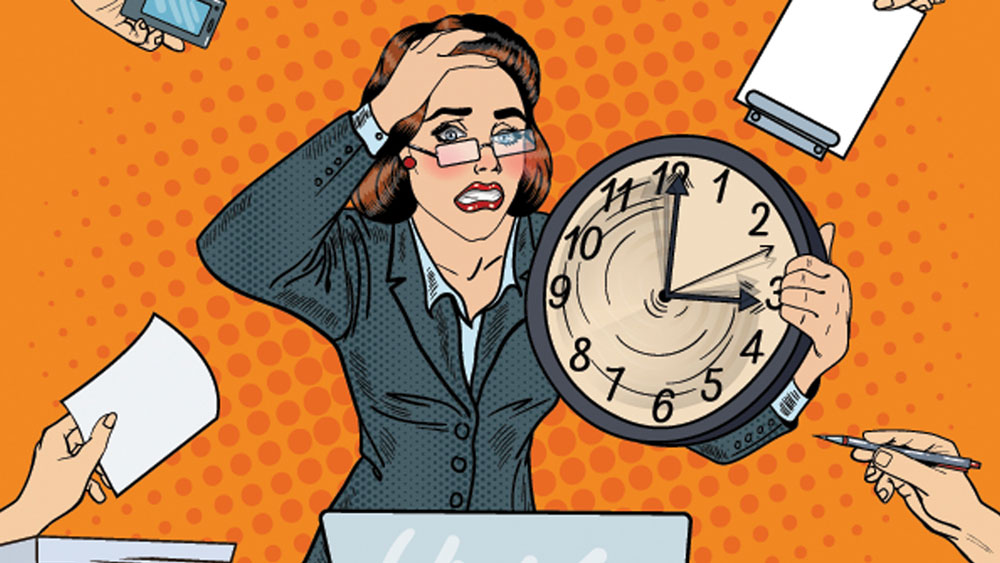In these difficult times in the world, human beings suffer from stress, an illness that affects the body and unbalances the existence of individuals.
It is defined as the body's reaction to conflict situations and it is a certainty that we all suffer from it to some degree.
Most adults have it at increasingly higher levels and it is not at all strange that children also suffer from its negative influence.
Renowned personalities and international institutions speak that modern coexistence is full of changes and uncertainties, which is a resounding truth.
Among the most common causes of its presence are divorce, the death of a loved one, serious illnesses, accidents, very hectic daily work, natural disasters or those caused by man such as wars and harassment of one nation against others; pressures in schools and workplaces; and concerns related to health, employment and the availability or lack of money.
This is a silent evil that eats away at society and community members. It is everywhere and the reactions of its sufferers can be diverse depending on the person, their age and other peculiarities.
In the face of a stressful situation at the moment or due to an accumulation of causes of various types, the muscles tense and pain arises; you breathe faster, causing hyperventilation and panic attacks in those who are prone to them.
If we look at the endocrine system, the glands produce hormones such as adrenaline and cortisol, which help the body seek to activate its mechanisms. The liver increases its blood sugar level to give us more energy and this tends to lead to diabetes, low immunity, mood changes and weight gain.
Stress can also affect sexual desire and function, and when the load is strong it causes impotence or alteration of the menstrual cycle.
The gastrointestinal, cardiovascular and nervous systems are also affected, producing, in that order: nausea, vomiting, diarrhea and constipation; just as the heart beats faster to distribute blood, chain changes are generated and from then on we could regret heart attacks, hypertension and strokes.
Irritability, anxiety, depression, headaches and insomnia become alerts that your nerves are out of control. Too much stress, then, can be fatal and you have to learn to live with it. It is not easy but alternatives are necessary to alleviate the possible consequences and therefore its aftermath.
How to cope with it is important, since there are ways to face it as it is a natural response of the body that allows us to face challenges and dangers.
We should start by knowing our own limitations and those around us, whether within the family or in the places we frequent. In order not to be thinking all the time about what bothers us, it is good to set goals and priorities.
Giving each thing or theme the significance it entails becomes a good way to battle in the face of everyday obstacles. Laughing, listening to music, talking with partners, family and friends, in turn, helps us find ways out of what is suffocating us.
We Cubans have survived the immoral blockade of the United States, health problems such as dengue, difficult periods such as the special period in the 90s of the last century, dissimilar and growing shortages (accentuated today); and a quarantine like the one that COVID-19 “gave us,” a recent example of how people grow larger than life in the face of demands. Being positive is essential, because negativity clouds the clarity of thoughts.
Once the reason for stress has been identified, we will have to find ways to reduce the effects and allow ourselves to maintain peace of mind, without resorting to supposed lifelines such as smoking, alcohol, drugs (which in the long run affect individual health and economy) or dependence on medicines, currently absent from the country's pharmacies given the difficult situation that Cuba is going through, and for which measures are introduced aimed at eliminating distortions and catapulting the economy, while protecting the population.
To take care of the moods that trigger alarms, seeing the good side of things, knowing how to determine between more or less serious problems, contributes a lot.
Exercise, walk, do your job, and set aside time to relax, according to your preferences. Doing what you like, in addition to pleasure, will make it easier for you to release stress.
Those of us who are addicted to work are advised to give space to habitual occupations, on which economic income depends, and also to allocate schedules, days, moments, for work. Entertainment: walking, sharing with other people, reading, listening to the radio, watching television, answering emails, WhatsApp and social networks without admitting that technologies dominate us.
“The man who has discernment will remain calm,” says a very wise and concise Bible proverb. Such an accurate statement enlightens us in these vicissitudes of dealing with tensions, illnesses, loneliness and restrictions.
Each individual tries to lead his life like a ship towards a safe harbor; but if he does not achieve it on his own, he does not hesitate to seek professional help. That doesn't mean he failed, but rather he needs some good advice and who better than the experts to guide him. There is also 103 for telephone consultations with people who know how to listen and suggest viable proposals. You let go of your burden when, without being face to face, a doctor hears you and directs your actions.
However, it is good to know that you cannot let others resolve your anxieties, because your own actions will be the best ways to rise above the burdens that harass you. It is possible, with intelligence and the desire to improve oneself, to also live with our daily stress.
Translated by Linet Acuña Quilez



